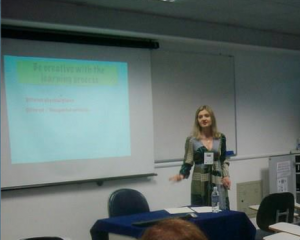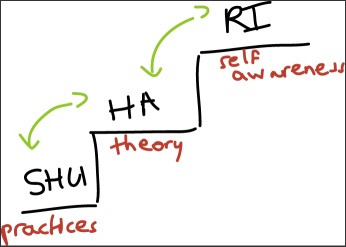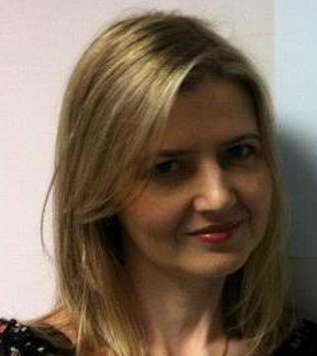Malu Sciamarelli — Brazil
Malu Sciamarelli is an EFL teacher in Brazil. She teaches in language schools and in companies, where she’s developed a new concept of ELT in the workplace. She’s passionate about helping students find their own motivation. She believes that if we, as teachers, create these motivational conditions in the classroom, learning will be a pleasant adventure. She’s also an enthusiastic runner and musician and she loves dogs.
What are you passionate about, Malu?
Two words excite me: curiosity and creativity. I feel the need to know, explore, understand, learn, predict — in fact anything that may lead to a new way of thinking. Maybe that’s why I’m so passionate about teaching: because I can affect how students perceive the world around them. I believe I can ignite a spark of curiosity and help them develop their own creativity. I feel I can help them overcome fears, express themselves, initiate ideas, plans, actions and a desire for lifelong learning. What I have found is that the more I teach, the greater my own need to learn develops both professionally and personally – my own inseparable challenges! Once a colleague asked me ‘Why do you care so much? It’s just a job!’ For me, it’s not just a job – it’s my life. It’s what drives me. It’s who I am.
How and why did you become a teacher?
Picture a group of girls, sitting under a tree in the school garden, earnestly promising to stay together through high school and university. We were only ten years old at that time but knew we loved English. Being a teacher didn’t occur to us then, so we promised to follow our dream by studying English Language Translation and Cultural Studies and go on to work all together as translators. I was the only one who kept that promise. The others fell by the wayside to courses such as Business and Dentistry.
In my junior year at 18, I was offered a position in a multinational bank abroad and a promising career in Business. Imagine the reaction from my friends and family as I turned it down to go on with my translation studies. There was one person, my father, who offered support, urging me to follow and live my dream — though I knew even he wasn’t entirely happy about my choice.
As a newly fledged translator, I was ready to translate the world. However, to help out a friend I agreed to teach her English classes for just three weeks. As you all know, teaching is contagious! The weeks became months and years. In fact, now picture me having taught for nearly 19 years. There is no other profession where our passion can ignite determination in others to follow their dreams. I could never see myself wanting to do anything else!
What are you most interested in right now, Malu?
Right now I’m very interested in the implementation of a project that I developed with a teaching colleague in a software company in Brazil. We have both worked teaching English in companies for over 10 years and came to the realization that while we might be teaching business vocabulary and practising the textbook exercises, our students weren’t learning much they could actually use. Our students were aliens in a business world. We immersed ourselves for 6 months in the company, participated in meetings, conference calls, analyzed methodology and evaluated real needs. As a result we identified three points to target:
1. Teachers often visualize Business English very differently from what a company wants.
2. Students often visualize their own knowledge quite differently from what they can actually do and what their company needs.
3. Business books often visualize the world in a generic and superficial way that is far from reality.
So…our answer! We created EBP – English Boost Program. It’s an innovative way of teaching English. The syllabus and assessments are developed focusing on each student’s needs, making use of simulated meetings and conference calls. We developed the structure of the program and delivered it in the company, full-time, 8am-6pm, Monday to Friday.
Now as teachers, we see we have to understand how the company works, be aware of the trends, and observe each student in action to develop an individualized plan. Before we started this program, the software company had been in jeopardy of losing their main client because they couldn’t communicate effectively. Now, due to the improvement in real skills, they have not only kept the contract but also opened new offices in Latin America, Asia and the USA. I was responsible for training teachers to implement EBP in offices in Brazil, Argentina and China.
What things do you do to help you get better at being a teacher?
There are various things that help me develop professionally. For my skills and knowledge, I subscribe to EFL magazines and websites and participate in webinars and courses online. For teaching practice reflection and self-awareness, I do frequent peer observation: twice a month I observe other colleagues’ classes as well as be observed. Each month, we have a feedback and development session. Also, after each class, I do a reflective practice with my students, which not only helps my own development but also their perception of learning, and it works as follows:
1. At the end of the class we review what we did and list the results.
2. We analyze the results and discuss how I, as a teacher, and they, as students, influence the outcome.
3. Finally we plan what we will do differently the next time.
But from my point of view, my PLN (Personal Learning Network) and communities of teachers are the best ways to share knowledge, skills, theories, practices, materials, experiences and new trends in ELT. I also believe that participating in conferences and having the opportunity to network face to face with these communities is vital.
What’s the biggest challenge you face as a teacher?
One big challenge that I’m facing at the moment is how to maintain students’ motivation until the end of a course. Initial motivation flows easily but to know how to sustain it in individual students is much more challenging. What I’m working on is making learning stimulating with motivating tasks that protect and build students’ self-esteem. In addition, I’m promoting both independence and cooperation among student groups.
With these practices, the objective is to increase their satisfaction and help them continue to reassess individually what drives their learning, so that they can maintain it until the end of the course.
What advice would you give to a teacher just starting out on a journey of professional development?
Simple – ask for help whenever you need it! Accept advice and suggestions from more experienced teachers and also be willing to share your opinions, beliefs and teaching practices. A community is the best place to do it and it has a big impact on our development.
I also believe that one key point in teaching is to know your students, so that we can meet their needs and create a pleasant and supportive atmosphere in the classroom. And when the students know that the teacher is getting to know them, they will know that the teacher cares!
Malu, is there any blog or online link you’d like to recommend?
I follow some blogs, but must confess that I read different posts everyday. What I do is check what teachers from my PLN in Twitter and Facebook are posting daily, then select the ones that interest me most. It’s a great way to keep up with the trends in ELT and also select what you need to read at a specific moment in your teaching development or simply be inspired by what other teachers are writing.
What’s your favorite quotation about being a teacher?
“The teacher in you shines through in all your actions!” — Yehuda Berg.
I believe teachers’ lives become examples and inspirations for students to follow.

 Malu’s One Rule – Malu Sciamarelli
Malu’s One Rule – Malu Sciamarelli 



